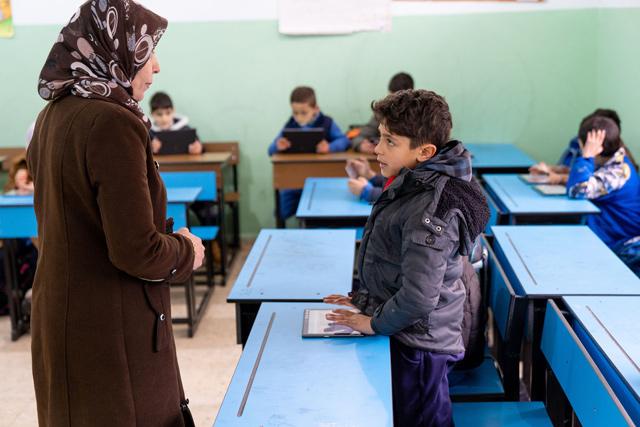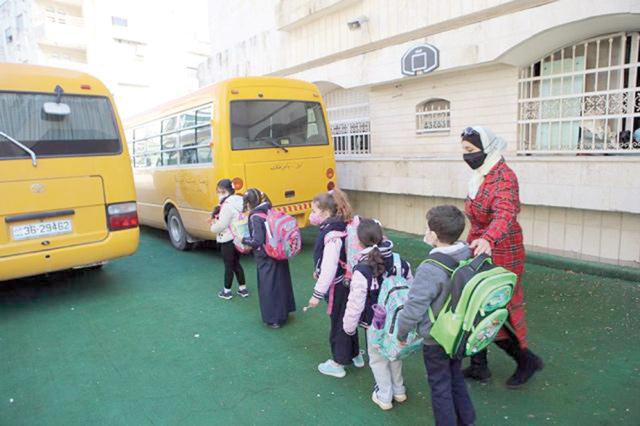You are here
UNICEF literacy programme draws on past success, revamps for future
By Victoria Irene - Sep 12,2019 - Last updated at Sep 12,2019

UNICEF’s ‘Let’s Live in Harmony’ multimedia literacy project was designed to improve reading capabilities of refugee and Jordanian children (Photo courtesy of UNICEF Jordan)
AMMAN — After being implemented in 100 public schools, benefitting 15,000 schoolchildren during the last academic year, UNICEF’s “Let’s Live in Harmony” literacy programme is working together with the Ministry of Education to expand the ICT-integrated project to reach more schools and children, according to a UNICEF official.
The “Let’s Live in Harmony” multimedia literacy project was designed to improve literacy capabilities of refugee and Jordanian children between the ages of five and 10 in double-shift schools, equipping students with grade-appropriate stories via “Android open-source technology accessed through tablets provided to schools”, according to UNICEF Jordan’s website.
The programme is run by UNICEF in partnership with the Ministry of Education, implemented by Integrated International and supported by UK Aid, UNICEF Jordan Education Specialist Rana Kawar told The Jordan Times in an e-mail interview on Wednesday.
Materials for the project, comprising a library of 100 stories, were designed to complement the national curriculum by developing critical thinking and communication skills and fostering respect and teamwork among students from KG to third grade. The materials were created in a digital, interactive format to be administered via tablets during a weekly extracurricular class, according to the education specialist.
Through the support of the Queen Rania Centre for Education and Information Technology, 400 teachers were trained last year to administer the curriculum and lead supplementary classroom activities to help students practise and reinforce behaviours and skills covered in the materials, Kawar indicated.
After an initial trial run in 10 pilot schools, UNICEF implemented “Let’s Live in Harmony” in 100 schools throughout the Kingdom for the 2018-19 academic school year.
Kawar noted “extremely promising” results from the project, stating that an initial assessment showed “an increase in literacy performance, awareness of social cohesion vocabulary, and an increase in social and collaborative behaviour among Syrian and Jordanian children attending double-shift schools”.
She also mentioned that the organisation recorded “significantly improved reading outcomes across second-and-third grade students by 30.4 per cent, regardless of their sex or shift, and with a dosage of once a week over one semester”.
Additionally, “students gained an additional five words on average throughout the semester, as assessed by the Rapid Assessment for Reading Skills”.
The project received positive feedback from students, teachers and administrators alike. Rayyan, a seven-year-old student, said: “I like to use the tablet, it has pictures, animations, other things and songs and it is useful for our studies.”
Teacher Suad Nayef noted that the weekly session was “fun, interactive and attractive for students, [providing] them with information in an accessible way”, Kawar noted in the interview.
Asmaa Doughmi, principal of Khalda Secondary School, told The Jordan Times over the phone on Thursday that the weekly “activity class” for the first and third grades was “well enjoyed” by all students who participated within the school, including Iraqis, Libyans, Egyptians, Syrians and Jordanians.
“They improved,” she said. “There was a progress in their reading.” The only challenge, she noted, was the lack of sufficient tablets. “They had to wait their turn.”
UNICEF’s Kawar also pointed to this problem, stating that “the use of technology in education remains to be a costly solution”.
Currently, she said, UNICEF is “looking at alternative options, exploring the availability of infrastructure inside the schools and building on existing technology programmes within the Ministry of Education”.
Doughmi indicated that a re-run of the programme would be well-received, saying that her school as yet has no formal plan to implement it this year, but “we hope to”.
According to Kawar, the current goal is to integrate the programme “within its strategic direction to support the Ministry of Education in improving the learning outcomes of all children in Jordan and [re-enforce] the use of technology in education, in line with the Ministry of Education’s strategic plan 2018-2022.”
“We hope to build on the success of the programme and achieve similar, if not better results.”
Related Articles
AMMAN — A total of 400 teachers and 50 principals were honoured for their contribution to a UNICEF-supported project on Tuesday.
AMMAN — Over 3,000 children have begun attending a summer school programme established by the Ministry of Education and supported by UNICEF,
AMMAN — About 2.174 million students are returning to school on Wednesday to resume in-class education at the start of the 2021-2022 academi


















